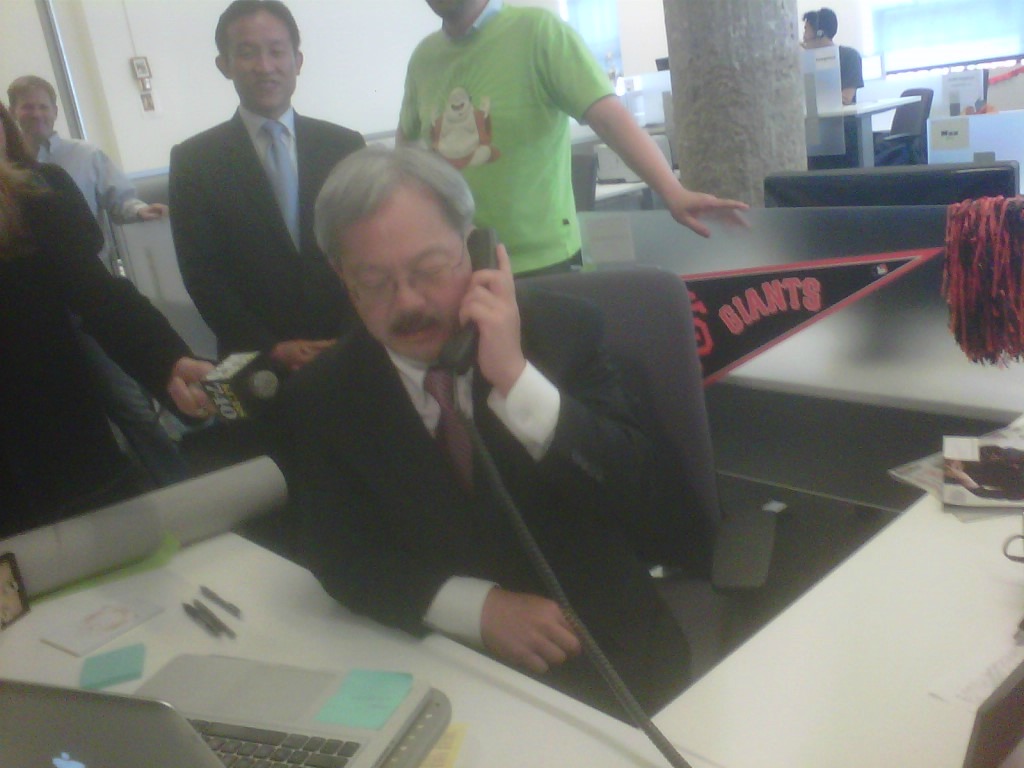Mayor Ed Lee Takes Call at Zendesk; Twitter Expected in May 2012

No companies have yet officially taken advantage of the tax break offered for companies moving into Central Market — the much ballyhooed “Twitter Tax Break,” so named for the social media company that threatened to depart San Francisco if not granted a reprieve on its local payroll tax bill — but the oft-blighted stretch of Central Market has its first new technology tenant, which may benefit from the lower tax bill by the time it next files its taxes.
Zendesk, a provider of help-desk software, had its new offices at 989 Market Street visited by Mayor Ed Lee and Board of Supervisors President David Chiu on Tuesday.
Once Zendesk files its paperwork — as it must do by November 1 — it will be the first firm to have its payroll tax slashed thanks to relocating to the “Central Market and Tenderloin Area Payroll Tax Exclusion” area, according to Amy Cohen of the Mayor’s Office of Economic and Workforce Development, which is overseeing the tax-break zone. Other companies can also apply for the payroll tax reduction at www.centralmarketpartnership.org.
Twitter, which signed a lease on the old SF Furniture Mart property at 1355 Market following the tax break’s passage into law in April, will move into the property sometime around May 2012, according to Cohen, and can begin slashing its payroll tax beginning that year.
For its part, Zendesk moved into the spacious and airy 35,000 square feet at 989 Market just last week, and while the tax break was a consideration, it wasn’t the decisive factor, according to Mikkel Svane, the firm’s CEO. “It [the tax break] was part of it… but a lot of different things came together” for Zendesk to choose the tax-break-eligible space, said Svane.
He noted that the property had the right mix of amenities and existing improvements — an architecture firm had most recently occupied the space, with the kind of open, full-of-light and people-friendly atmosphere sought — and that the location was also agreed upon by the firm’s workers who were asked if they felt safe working in the area. The payroll tax was an added plus when the firm’s real estate broker presented Zendesk with the lease opportunity, Svane said.
It’s not immediately known exactly how much cash Zendesk will save, Svane added.
The Twitter tax break can be said to have created jobs — Zendesk had 100 employees in its old offices in South of Market, but plans to expand to 150 by the end of the year, the mayor said, before taking a customer service call at his very own cubicle in front of a group of reporters (the call was from a member of Zendesk’s marketing department, but still).
There’s more in store for San Francisco businesses in terms of changes to the city’s tax structure, according to Board President Chiu. City funds are currently paying for a study conducted by outside business consultants and economists as to what tax would best benefit both job creation and the city’s commercial tax base, Chiu said.
It’s likely that the study will recommend a gross-receipts tax, according to Chiu, but it will be some months before the study is completed and released, Chiu said. A change in the tax structure would require voter approval, possibly at the November 2012 ballot, but what’s certain is that things need to change.
“Our business payroll tax is a huge drag,” Chiu said. “It’s the reason why tens of thousands of jobs and hundreds of companies have left the city.” But not Zendesk, and not Twitter.
Want more news, sent to your inbox every day? Then how about subscribing to our email newsletter? Here’s why we think you should. Come on, give it a try.









